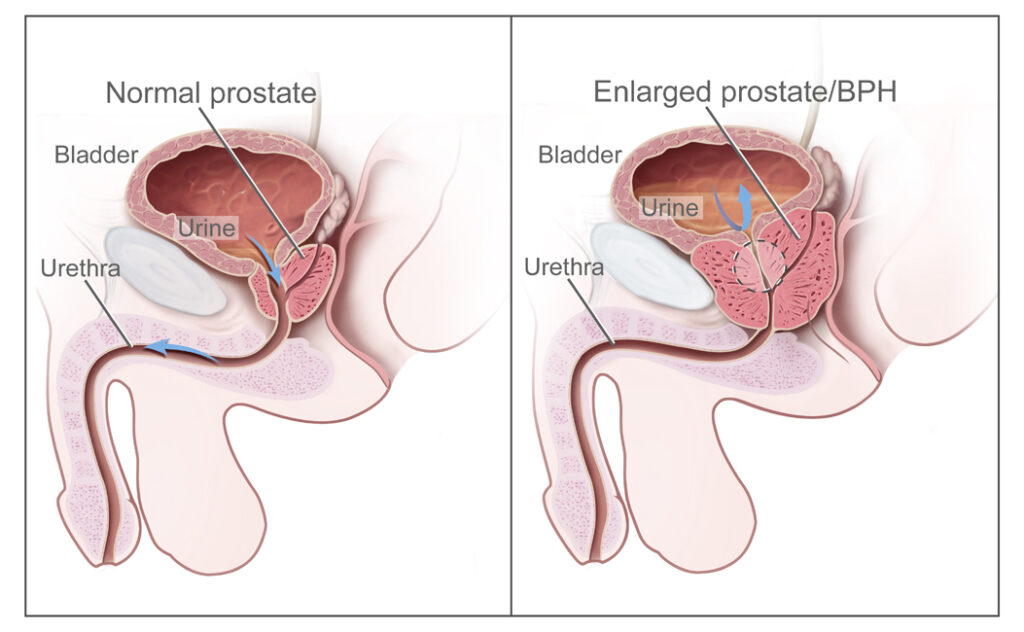What is Prostate?
Prostate is a gland found in a human male body situated just beneath the urinary bladder in the abdomen. The gland is roughly the size of a walnut and yellow in colour.
What is the function of the Prostate?
The normal human ejaculate has two components: sperms and seminal fluid. The seminal fluid provides a suitable environment for the survival and function of sperms. The sperms are produced in the male sex glands called the Testis. The seminal fluid is derived from accessory sex glands. The prostate gland is one of the accessory sex glands and contributes to the formation of seminal fluid.
What is BPH?
BPH stands for Benign Prostatic Hyperplasia. In simple terms, this means non-cancerous enlargement of the prostate gland. It is important to understand that enlargement of the prostate is a consequence of advancing age rather than a disease. It is a part of a natural process that the human body goes through as one’s age increases, contrary to the common misconception that it is a disease.
What is the common age for the presentation of the patient with BPH?
As mentioned earlier, BPH is a disease of old age. The disease is predominantly seen in patients above the age of 60 years, however, a considerable proportion of patients start showing some or the other symptoms after the age of 50 years. More than 90 percent of the individuals above age of 80 years show signs and symptoms of BPH.
What are the common symptoms that an individual with BPH experiences?
Most commonly, patients with BPH present with lower urinary tract symptoms (LUTS). Common LUTS are:
- Frequency – increase in the number of times one goes to the loo.Sense of Incomplete emptying
- Nocturia – frequent urination during periods of sleep
- Urgency – the inability to delay urination
- Hesitancy – trouble starting a urine stream
- Intermittency – an interrupted urine stream
- Weak urinary stream
- Abdominal straining at passing urine.
What will happen if one ignores his symptoms of BPH?
The individuals who tend to ignore their urinary symptoms are at high risk of experiencing worsening of their symptoms and eventual development of complications. Following are the complications that usually patients present with:
- Recurrent urinary infections.
- Bladder stones.
- Bladder damage.
- Renal failure in long standing cases.
- Bleeding in urine (rarely).
A patient can present with either one or more of the above mentioned complications.
What should one do if he feels he has symptoms related to BPH and what to expect?
The first thing that one should do is to consult a urologist near you. The urologist will take a detailed history of our symptoms and do a thorough physical examination. Apart from this, your Urologist may subject you to a certain set of blood and urine tests as well as imaging with Ultrasound. Another important tool in diagnosing a person with BPH is Uroflowmetry. Uroflowmetry is an objective test to assess the patients’ urinary stream.
What are the treatment options?
There are three options available for the treatment depending on the severity of symptoms: Lifestyle changes, medications and surgery – minimally invasive procedures.
Lifestyle changes comprise certain steps in daily life that need to be taken to reduce the symptoms related to BPH. These include steps like reducing the fluid intake, avoiding or reducing intake of caffeinated beverages and alcohol, reviewing the medication and optimising, treatment of constipation, and adopting healthy bladder habits. Lifestyle changes are recommended for those individuals who have no to minimal symptoms related to BPH.
Patients who present with mild symptoms and do not show any signs of complications are suitable candidates for medical management. Your urologist will prescribe you medications that will help in improving your urinary symptoms as well as help in decreasing the size of your prostate.
Surgery as a modality of treatment is reserved for patients who present with severe symptoms or those who develop complications due to ignorance of their symptoms. The other suitable candidates for surgery are those patients who do show benefits of medical management or are not suitable for medical management. So the notion that every person who develops symptoms of BPH needs surgery is wrong.
Surgery offered for BPH is a minimal access surgery that does not require any skin incision over the abdomen and will not leave the patient with any skin scars.
To know more about the medications used and surgical modalities that are available one needs to consult a urologist and initiate a discussion.

